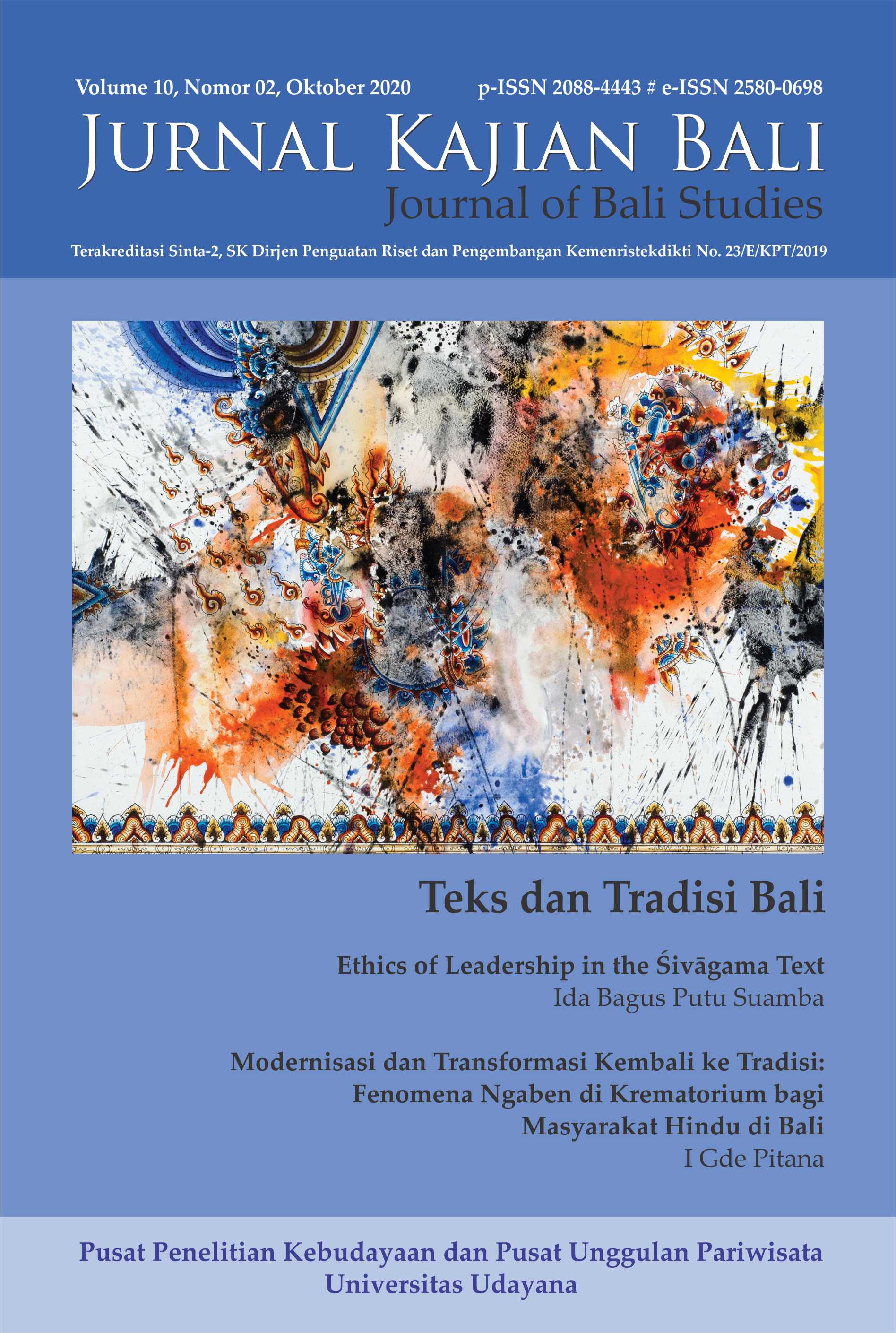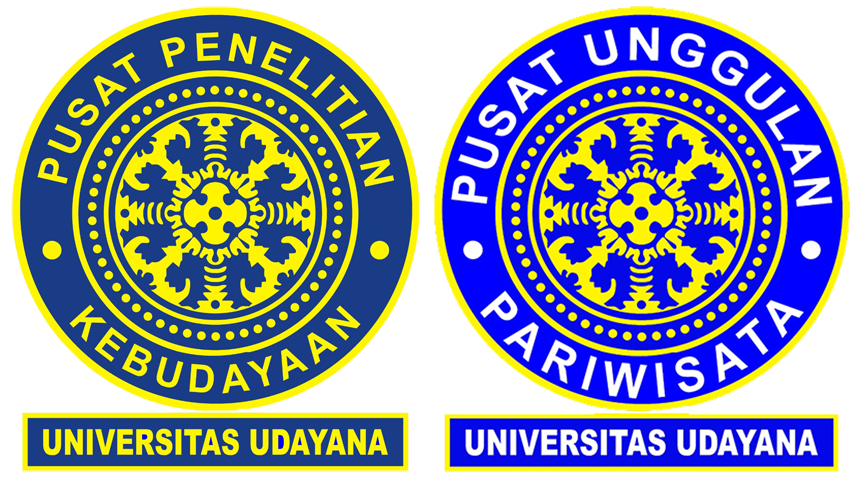Peran Nilai Hindu “Tri Kaya Parisudha” dalam Peningkatan Loyalitas Wisatawan Terhadap Desa Wisata Pedawa, Bali Utara
Abstract
Local wisdom based on Hinduism Tri Kaya Parisudha has an important role in the development of tourism in Pedawa Village, North Bali. This article analyzes the role of Tri Kaya Parisudha's values and practices as a spirit of hospitality in increasing the loyalty of tourists to visit Pedawa Village, one of the five ancient villages in Banjar District, Buleleng Regency. This qualitative study begins with data collection with field observations and interviews with thirty foreign and domestic tourists who have visited Pedawa Village more than once. The results showed that the loyalty of returning tourists was due to the friendliness, way of life, way of speaking and acting in the community which made tourists feel comfortable. In addition, it is also due to the uniqueness of the traditional house of Pedawa Village as a tourist attraction. The life habits of the Pedawa people that reflect the values of the Tri Kaya Parisudha have implications not only for the sustainability of tourism villages but also for strengthening the appreciation and practices of Hindu-based local wisdom in Pedawa Village.
Downloads
References
Andini, DN dan IBG Pujaastawa, G. (2018). ” Peran Serta Elit Desa dalam Pengembangan Pariwisata Cempaga Kecamatan Banjar Kabupaten Buleleng Bali”. Jurnal Humanis. Vol. 22 No.01, pp. 87-95
Amiri, N.S., Dastourian, B., Foroudi, P. and Nankali, A. (2017). “Information Technology Directors’ Efforts on Innovation, Integrated Marketing Communications and Brand Equity”. The Bottom Line. Vol. 30 No. 4, pp. 297-309.
Arikunto, Suharsimi. (1999). Prosedur Penelitian Suatu Pendekatan Praktek. Jakarta: Penerbit PT. Rineka Cipta.
Bali Travel News. (2019). “Desa Pedawa Padukan Potensi Pertanian dan Pariwisata” https://bali-travelnews.com/2019/02/24/desa-pedawa-padukan-potensi-pertanian-dan-pariwisata/ Diakses 21 Agustus 2020.
Berezan, O., Yoo, M., and Christodoulidou, N. (2016). “The Impact of Communication Channels on Communication Style and Information Quality for Hotel Loyalty Programs”. Journal of Hospitality and Tourism Technology. Vol. 7 No. 1, pp. 100-116.
Bin Hasbollah, H.R. (2014). “A theoretical framework for conserving cultural values of heritage buildings in malaysia from the perspective of facilities management”. PhD. Thesis, The University of Salford, United Kingdom.
Chevers, D. and Spencer, A. (2017). “Customer Satisfaction in Jamaican Hotels through the Use of Information and Communication Technology”. Worldwide Hospitality and Tourism Themes. Vol. 9 No. 1, pp. 70-85.
Desiani, Ratu Ayu Astri. (2018). “Warga di Desa Pedawa Buleleng Kembali Gelar Ritual 'Ngaga' Setelah Mati Suri 47 Tahun”, Bali Tribune News, 20 desember 2018, https://bali.tribunnews.com/2018/12/20/warga-di-desa-pedawa-buleleng-kembali-gelar-ritual-ngaga-setelah-mati-suri-47-tahun. Diakses 21 Agustus 2020.
Douglas E. Hughes. Niels Schillewaert. (2007). "Why sales reps should welcome information technology: Measuring the impact of CRM based IT on sales effectiveness". Intern. J. of Research in Marketing Vol. 24, pp. 336-349.
E.B Tylor. (1871 [1924]). Primitive Culture. New York: Bretano’s.
Frangos, C.C., Karapistolis,D. and Stalidis,G., Fragkos, C., Sotiropoulos, I.D., and Manolopoullos, I.E. (2014). “Tourist loyalty is All About Prices, Culture and the Sun: A Multinomial Logistic Regression of Tourist Visiting Athens”. Procedia – Social and Behavioral Sciences. Vol 175, pp.32 – 38.
Gregori, N., Daniele, R., & Altinay, L. (2013). “Affiliate marketing in tourism: Determinants of consumer trusts”. Journal of Travel Research. Vol. 53 (2), pp. 196-210.
Hawkins, D.I., Best, R.J., and K.A Coney. (1992). Consumer behavior implication for Strategy”. Homewood: Richard D. Irwin Inc.
Haribawa, Avenzora, dan Arif. (2017). “Analisis Orientasi Stakeholder Untuk Pembangunan Ekowisata Di Wilayah Bali Aga, Buleleng-Bali”. Media Konservasi Vol. 22 No. 3, pp. 269-276.
Hänninen, N. and Karjaluoto, H. (2017). “The Effect of Marketing Communication on Business Relationship Loyalty”. Marketing Intelligence & Planning. Vol. 35 No. 4, pp. 458-472.
Hughes, K. (1991). Tourist Satisfaction: A Guided Cultural Tour in North Queensland. Journal of Australian Psychologist. Vol. 26, No. 3, pp. 166-171.
Hofstede, G. (1997). Cultures and Organizations: Software of the Mind. London: McGraw-Hill.
Holloway, J.C. (1988). Marketing For Tourism (4th edition). London: Pitman.
Kotler, P. (1998). Marketing Management: Analysis, planning, implementation, and control (9th ed.). Englewood Cliffs, New Jersey: Prentice Hall.
Khuong, M.N. and Ha, H.T.T. (2014). “The Influences of Push and Pull Factors on the International Leisure Tourists’ Return Intention to Ho Chi Minh City, Vietnam — A Mediation Analysis of Destination Satisfaction”. International Journal of Trade, Economics and Finance. Vol. 5 No. 6, pp. 490 – 496.
Maheswari, dan Sariani. (2018). “Strategi Pengembangan Desa Wisata Dengan Menggunakan Konsep Community Based Tourism (CBT) Di Desa Sidatapa Kecamatan Banjar Kabupaten Buleleng”. Jurnal Kepariwisataan. Vol. 17 No. 2. pp.42-53.
Maslow, A. (1984). Motivation and Personality. New York: Harper and Row.
McIntosh, R.W. & Goeldner, C.R. (1986). Tourism: Principles, Practices, Philosophies. New York: John Wiley & Sons.
Mudiarta. (2020). “Khawatir-COVID-19,Warga-Pedawa-Minta Kunjungan Mahasiswa Jepang Dijadwal Ulang”, Bali Post, 5 Maret 2020 https://www.balipost.com/news/2020/03/05/107784/Khawatir-COVID-19,Warga-Pedawa-Minta.html Diakses 21 Agustus 2020.
Mustofa, Ali (ed). (2020). “Mengenal Rumah Tua Adat Desa Pedawa, Tersisa 32 Bangunan, Atap dari Bambu, Diusulkan Jadi Cagar Budaya”, 12 Maret 2020, Radar Bali, https://radarbali.jawapos.com/read/2020/03/12/183327/tersisa-32-bangunan-atap-dari-bambu-diusulkan-jadi-cagar-budaya. Diakses 21 Agustus 2020.
Paniccia, P., Pechlaner, H., & Valeri, M. (2010). The Important of Time of experience in the Innovation of Tourism Business. The Sextantio Albergo Diffuso. In K. Weiermair, F. Go, P. Keller, & H. Penchlaner (Eds.) Entrepreneurship and Innovation in Tourism (pp.116). Berlin: Erich Schmidt Verlag.
Prajnawrdhi. dan Pebriyanti. (2016). “Sanggah Kemulan Nganten dan Pelangkiran: obyek penentu keberlangsungan rumah tinggal tradisional Desa Pedawa, Bali”. Jurnal RUAS. Vol. 14 No. 2, pp.58 -68
Peters, J.H., & Wardana, W. (2013). Tri hita karana: The spirit of Bali. Jakarta: Kepustakaan Populer Gramedia.
Richards, G. (2002). “Tourism Attraction System: Exploring Cultural Behaviour”. Annals of Tourism Research. Vol. 33 (4), pp. 1048-1064.
Sardiana, K.I & Purnawan, R.L.N. (2015). “Community-based Ecotourism in Tenganan Dauh Tukad: An Indigenous Conservation Perspective”. Jurnal Kajian Bali. Vol. 05 No. 02, pp 347-368
Sari, Ida Ayu Laksmita. (2019). “Unsur unsur Pengetahuan Sosial dalam Cerita Rakyat Bali Aga dan Buku Pelajaran Sekolah Dasar Zaman Kolonial Belanda”. Jurnal Kajian Bali. Vol. 09 No. 02, pp 499-520.
Seric, M., Saura, I.G., and Descals, A.M. (2016). “Can Advanced Technology Affect Customer-Based Brand Equity in Service Firm? An Empirical Study in Upscale Hotels”. Journal of Service theory and Practice. Vol. 26 No. 1, pp. 2-27.
Sönmez & Graefe. (1998). “Determining Future Travel Behavior from Past Travel Experience and Perceptions of Risk and Safety”. Journal of Travel Research. Vol. 37(2), pp.171-177.
Stebbins, R. A. (1996). Cultural tourism as serious leisure. Annals of Tourism Research. Vol. 23 (4), pp. 948–950.
Suyatra, I Putu (ed). (2017). “Kubu Hobbit di Desa Pedawa; Iseng, Tak Disangka Digandrungi Remaja”, Bali Express, 19 Juli 2017, https://baliexpress.jawapos.com/read/2017/07/19/2096/kubu-hobbit-di-desa-pedawa-iseng-tak-disangka-digandrungi-remaja Diakses 21 Agustus 2020.
Supriyandana, Putu Yuli. (2020). “Sambut Tahun 2020, Pemuda Kayoman Pedawa Tak Henti Tanam Pohon”, Tatkala, 2 Januari 2020, https://tatkala.co/2020/01/02/sambut-tahun-2020-pemuda-kayoman-pedawa-tak-henti-tanam-pohon/ Diakses 21 Agustus 2020.
Rosalina, D. (2017). “The implementation of hindu philosophy “Tri Kaya Parisudha” For Sustainable Tourism In Munduk Village, North Bali”. JUMPA. Vol. 3 No. 2, pp. 223-237.
Silva et al. (2019). index: A new indicator for measuring tourist destination loyalty?”. Journal of Innovation & Knowledge. Vol. 4, pp.71-77.
Sugiono. (2002). Metode Penelitian Bisnis. Bandung: Penerbit CV. Alfabeta.
Subadra, I N. (2019). “Producing Alleviating poverty through community-based tourism: Evidence from Batur Nat”. African Journal of Hospitality, Tourism and Leisure, Vol. 8 (5), pp. 1-23.
Subadra, I N. dkk. (2019). “Investigating Push and Pull Factors of Tourists Visiting Bali as a world Tourism Destination”. International Journal of Multidisciplinary Educational Research. Vol.8 (7), pp. 253-269.
Van der Borg, J. & Costa, P. (1995). “Cultural Tourism in Italy”, Centro Internazionale sull’Economia Turistica, CISET, pp 1-28.
Widiastuti. (2018). “Ketahanan Budaya Masyarakat Bali Aga dalam Menciptakan Desa Wisata yang Berkelanjutan”. Jurnal Kajian Bali. Vol. 08 No. 01, pp: 93-120.
Worsfold, K., Fisher, R., McPhail, R., Francis, M., and Thomas, A. (2016). “Satisfaction, Value and Intention to Return in Hotels”. International Journal of Contemporary Hospitality Management. Vol. 28 No. 11, pp. 2570-2588.
Oliver, R. L. and W. S. DeSarbo. (1988). "Response Determinants in Satisfaction Judgement". Journal of Consumer Research. Vol. 14, pp. 495-507.
Reuter, Thomas. (2018). The house of Our Ancestor: Precedence and Dualism in Highland Balinese Society. Jakarta: Yayasan Pustaka Obor Indonesia.
Zhang, H., Fu, X., Cai, L. A., & Lu, L. (2014). “ Destination image and tourist loyalty: Meta-analysis”. Tourism Management. Vol. 40, pp. 213–223.

This work is licensed under a Creative Commons Attribution 4.0 International License.



















